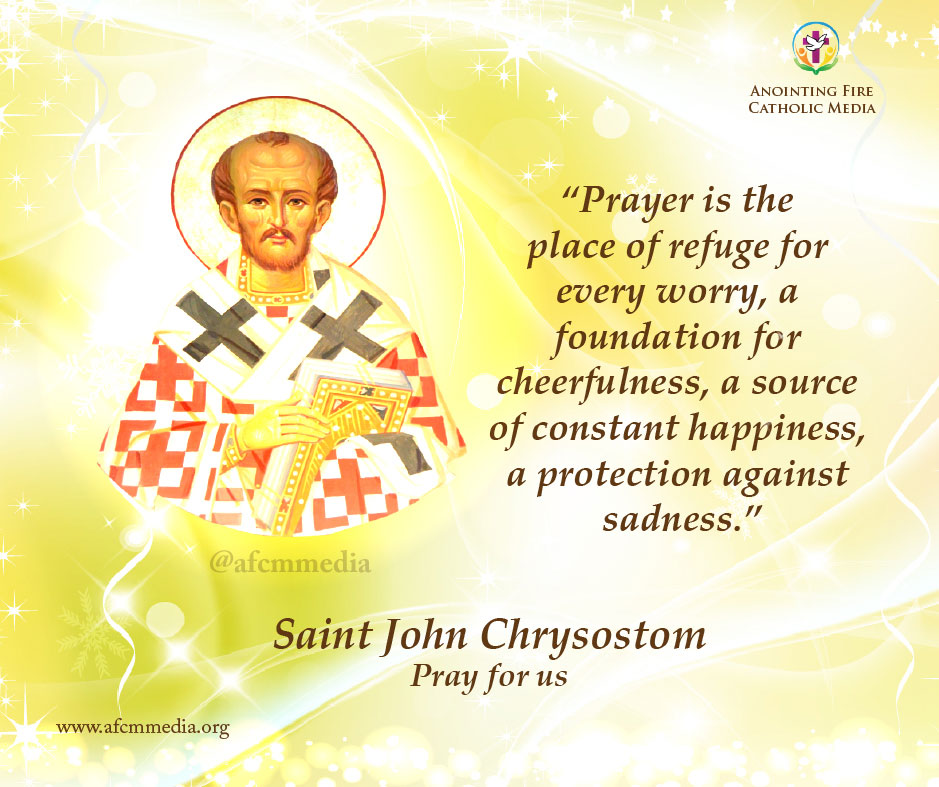|
Saint John Chrysostom
Feast day : 13 September
Today the Church celebrates the feast of Saint John Chrysostom, Archbishop of Constantinople and one the greatest preachers of Christianity. He lived during the period 349-407. He was greatly renowned for his eloquence in his speech and writing. He is honoured as a Doctor of the Church for his literary contributions and is regarded as one of the most prolific authors in the early Church, probably exceeded by only Saint Augustine of Hippo in the number of literary works. After his death he was given the Greek surname chrysostomos,(Chrysostom in English) meaning "golden mouthed," which is a tribute to his eloquence. His feast is celebrated on 13 September. He is the patron saint of Constantinople, teachers, orators, preachers, lecturers and epileptics.
Early life:
Saint John was born in Antioch to parents Secundus and Anthusa in the year 349. His father died soon after his birth and he was raised by his mother who is believed to have been a pagan. Under her influence, St.John began his education under the pagan teacher Libanius from whom he acquired the skills for a career in rhetoric, as well as a love of the Greek language and literature. As he grew older, however, he became more deeply committed to Christianity and went on to study Theology under Diodore of Tarsus for four years. In 374, he began to live the life of an ascetic and became a hermit for two years living in the mountains near Antioch until the poor state of his health forced him to return to Antioch. Shortly after his return to Antioch, he was ordained a deacon by Meletius and in the year 386 he was ordained a priest by Bishop Flavian I.
Vocational life:
The first 12 years of his priesthood in Antioch were glorious and fruitful. He gained popularity because of the eloquence of his public speaking, especially his insightful expositions of Bible passages and moral teachings. The most valuable of his works from this period are his homilies on various books of the Bible. He preached on charity and almsgiving and was greatly concerned with the spiritual and temporal needs of the poor. He also spoke out against abuse of wealth and personal property of the rich. His sermons were practical, explaining the Bible's application to everyday life and it was his straightforward preaching that helped him gain popularity among the people. But these days of glory were soon to end.
In 398, Saint John was requested against his will to take the position of Patriarch of Constantinople. His time in Constantinople was more tumultuous than his time in Antioch. He was just the opposite to his predecessor Bishop Nectarius and he began reforming the system from top to bottom by eliminating abuses and malpractices. He gave no banquets, ate a scanty meal in the evening, dressed poorly, sold the rich furnishings of the bishop's palace and even some of the ornaments of the churches and gave money, food and clothing to the poor. His actions raised a lot of opposition in some vested circles. Lies and defamation of character grew until they culminated in the Synod of the Oak. The biased Synod issued a decree of deposition and St. John was exiled for a short while. Following his exile, some misfortune fell on the Empress and it is believed that she had a change of mind. She took it as a Divine judgement and had him return to Constantinople. But after his return, the Empress again changed her mind and more enemies kept pressing for his removal.
In the year 404, at Easter there was violence and bloodshed in the Cathedral and a few attempts on his life too. On June 20, 404 he left on his second and last exile. On that same day, a mysterious fire burned down the Cathedral and the adjacent Senate House for which he was made to stand trial. St. John remained in Cucusus in Armenia in exile where he suffered greatly due to poor health.
Death & Sainthood:
A year later for fear of his enemies he travelled from Cucusus and kept moving from village to village until he came to Arabissus. But he was further exiled from here too by his enemies. Though he was a sick man, his enemies showed no mercy. He was forced to roam mountain ranges in the scorching heat and cold winters. On September 14, 407 he was too sick to continue. He stopped by a Chapel and received Holy Viaticum from a priest. His last words were "Glory be to God for all things. Amen". A few years later, in 438, his body was transferred to Constantinople. In 1204, his relics were moved to St. Peter's in Rome.
St. John Chrysostom is counted as a one of the four great Eastern Doctors of the Church alongwith St. Basil, St. Gregory Nazianzen and St. Athanasius. In 1909 Pope Pius X made him the special patron of all those who preach the Word of God. He is the patron saint of Constantinople, preachers, teachers and epileptics. His feast day is celebrated on 13 September.
Brief Background:Bishop and Doctor of the Church:Born : In Antioch in 349 Died : At Commana, Pontus on 14 September 407 Patronage: Constantinople; epilepsy; lecturers; orators; preachers Literary Contributions: : |
